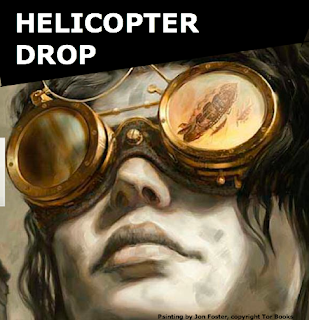Ah, Charlie Jane Anders has a website(!) and I had assumed Charlie's a he but she's not.(!)*
And she has a review of the movie Dylan Dog over at io9,** which is currently sponsored by Dylan Dog:
We've talked a lot lately about the fact that urban fantasy and noir detective stories have been converging, and urban fantasy is where a lot of the most interesting noir writing is happening. But the danger with both those genres -- either together or separately -- is that they'll devolve into pastiche. The worst case scenario with the cliches of tormented loner detectives, and big-city vampires, is that they'll become endlessly self-referencing and fatally mindless.
If you want to see that threat made real, just watch Dylan Dog. It's either a very unfunny comedy, or a very inactive action movie, one or the other.
There's nothing in Dylan Dog that you haven't seen a million times before. Except that you've probably never seen it done this inertly.Anders penned two of my favorite recent reviews:
5 Theories That Explain Why Avatar Was Such a Huge Hit
Michael Bay Finally Made an Art Movie
Imagine that you went back in time to the late 1960s and found Terry Gilliam, fresh from doing his weird low-fi collage/animations for Monty Python. You proceeded to inject Gilliam with so many steroids his penis shrank to the size of a hair follicle, and you smushed a dozen tabs of LSD under his tongue. And then you gave him the GDP of a few sub-Saharan countries. Gilliam might have made a movie not unlike this one.
Twitter is slowly sucking me in. I discovered Anders website, because Matt Yglesias RT/"retweeted" a tweet from Jamelle Bouie who retweeted @arjacheAnd the true genius of Transformers: ROTF is that Bay has put all of this excess of imagery and random ideas at the service of the most pandering movie genre there is: the summer movie. ROTF is like twenty summer movies, with unrelated storylines, smushed together into one crazy whole. You try in vain to understand how the pieces fit, you stare into the cracks between the narrative strands, until the cracks become chasms and the chasms become an abyss into which you stare until it looks deep into your own soul, and then you go insane. You. Do. Not. Leave. The Cabinet
Why won't the President disclose the results of his Voight-Kampff test? How do we know he's not a replicant?On arjache's twitter page, I found a "RT" from Anders, who retweeted
RT@DalekThay: THE DALEKS WOULD LIKE TO SEE THE DOCTOR'S BIRTH CERTIFICATE, BUT WE WOULD SETTLE FOR HIS DEATH CERTIFICATE.---------------------
*Then I looked her up on Wikipedia and learned she's transgendered (!) and co-edits io9 with her partner Annalee Newitz (!)
** "Michael Moran of The Times' Eureka Zone blog, wrote, "Ostensibly a blog for science fiction enthusiasts, io9 finds space for pieces on cutting-edge technology, the wilder fringes of astronomy and the more worrying implications of grey goo."***
***Grey goo: " is a hypothetical end-of-the-world scenario involving molecular nanotechnology in which out-of-control self-replicating robots consume all matter on Earth while building more of themselves,(!) a scenario known as ecophagy ("eating the environment"). Self-replicating machines of the macroscopic variety were originally described by mathematician John von Neumann, and are sometimes referred to as von Neumann machines. The term grey goo was coined by nanotechnology pioneer Eric Drexler in his 1986 book Engines of Creation, stating that "we cannot afford certain types of accidents." In 2004 he stated "I wish I had never used the term 'grey goo'."





